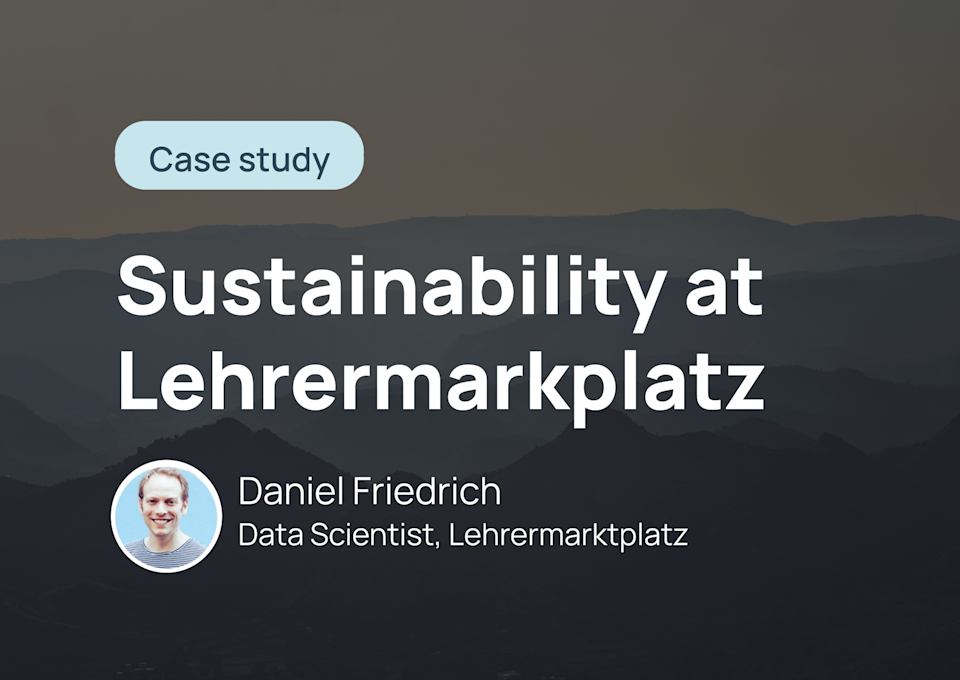
Lehrermarktplatz is an online platform where teachers can share and sell online learning materials. It’s the largest platform of its kind in Germany and has over 100,000 resources being shared by over 400,000 teachers.
On all levels their team values sustainability, therefore they take climate action in their private lives, in the office, and are also looking for ways to drive impactful action through their product. Dr. Daniel Friedrich is a data scientist at Lehrermarktplatz and has spearheaded many of the initiatives aimed at reducing their carbon footprint.
Daniel highlighted the two major goals that Lehrermarktplatz has in order to fulfill their climate pledge: firstly, gaining an understanding of their impacts through a company-wide carbon assessment and, secondly, taking steps to reduce this impact wherever possible - given that they already have a 100% digital product.
Carbon emissions assessment
Daniel previously had professional experience with emissions assessment for other industries, so he already knew how to tackle this task in the most efficient way, adapting his knowledge to the Lehrermarktplatz business model.
He reviewed every aspect of the company’s carbon emission sources, both office-related and product-related:
Office size, electricity use, heating
Food consumption in the office
Business trips and team events
Employee commute
Office equipment
Servers and IT-related emissions, etc.
This approach with a tailored calculation process specifically for their company - instead of using standardized calculation tools - helped them to focus and reveal the main emission sources with minimal time spent on data gathering.
As a result, they’ve found out that more than 50% of their footprint is caused by cloud computing; around 30% is generated in their offices; around 15% refers to business travel; and other emission sources are too small to count.
Side project to drive climate action in the business network
For all of their initial internal calculations just an Excel spreadsheet was enough. However, with the mission of making corporate carbon assessment more available and barrier-free for other German service-oriented companies, they decided to build a non-profit side project - CO2stop.earth.
This is a carbon footprint calculation tool developed in cooperation with an edtech start-up, Repeat Mobile, launched at the beginning of 2020. This free platform allows small and medium-size companies to input all their carbon-emitting activities directly onto the website and immediately get a clear image of what their carbon footprint is. The tool also offers simple advice on how to reduce each category of emission sources.

Carbon footprint reduction
When it comes to reduction measures, some companies prefer to start small, go with incremental steps, tackle ‘low-hanging fruits’ then, with time, scale up and tackle more complicated problems. Daniel and his team decided to move in the opposite direction: from the very beginning they looked at their biggest contributions to carbon emissions and set goals to reduce them as much as possible.
Lehrermarktplatz has already implemented many reduction measures. Even when it came to challenging topics, like reducing business travel, the new policy was accepted in the company without resistance, as their team members across all levels already shared sustainability values.
Avoiding emissions in the office Here are just some of the measures that have been implemented in the company:
Providing vegan/vegetarian shared lunches
Reducing business-related travelling, conducting meetings virtually, and travelling by train if possible
Organizing company team events accessible by train or by (electric) car
Office energy use audit with
, revealing how much energy the company consumes and where it can be improved in terms of heating, electricity, and electrical appliances
Using 100% green energy in the office, highly efficient light bulbs, switching off unused electrical equipment, and installing automated thermostats for heating appliances
Employees in the Berlin office are proactive in cycling to work or using public transport
However, some business activities still require compromises. For instance, with the team split between Germany and Ukraine, it is important for corporate culture to gather the whole team together physically once a year for a team-building event. Even though there is a train connection between Berlin and Kiev, it takes about 20 hours to cover that distance, so they have made the decision to still buy plane tickets and offset these flights.
Reduction in cloud operations Cloud operations cause more than 50% of the footprint of this company, so it’s important to look for ways to reduce it. Due to the nature of their digital platform, there are a lot of uploading and downloading activities, which increases the server capacity a lot. They have two providers for this infrastructure: AWS Germany and Digital Ocean. Both of them have much potential for improvement in terms of sustainability, although both claim that at least their data centers in Frankfurt are climate neutral already. We all hope that in the future it will be prooved by more transparent reports, and that these providers will also turn all of their data centers climate neutral or positive in the nearest years.
Internally at Lehrermarktplatz they have discussed changing these providers to more transparent ones. It’s a big ask, as the whole product infrastructure is built on that. While they might go for it later, at the moment, they are not ready for such a transition, but they are willing to put some pressure on their current providers to become more eco-friendly. This was even one of their incentives to join LFCA, as they strongly believe that together with our network we have a higher chance of prompting change from big and influential industry players such as AWS.

Compensation of remaining emissions
They started this process with measuring emissions generated in 2018, and since then have repeated the exercise every year, continuously working on reduction and compensating for the rest.
They have decided to support a project in Malawi to replace traditional wood burning sites with more efficient cooking facilities. This project was chosen as it not only reduces greenhouse gas emissions, but also protects people’s health (according to WHO, nearly 4 million people die every year as a result of the smoke pollution from cooking stoves and fuels), strengthens the role of women and children (who traditionally have the task of collecting firewood), and saves families money (many families have to buy their firewood).
Leveraging the power of the product
Among other teaching materials, they also have a big variety of climate-related tutorials, workbooks, and class games on their platform. They help teachers to explain to kids in German public schools the nature of the current crisis and outline the most effective solutions. Part of these materials are available free of charge. The company also promotes some of these materials on their own social media channels and discusses this topic on their podcasts. Moreover, whenever their team is participating in Fridays for Future strikes, they also share this with their followers, inspiring them to do the same.
Another area of impact is a direct dialogue with more than 400,000 teachers that use this platform on a daily basis. The content team has developed a detailed tutorial for teachers on how to carry out emissions assessments in the schools where they work and to turn them climate neutral. They have even done a few test runs for this tutorial in schools already. To take part, teachers simply need to gather data about their school’s size, electricity and heating, and paper consumption (both printing and toilet paper). This will help to calculate the total footprint of the school, reveal the highest reduction potentials, and serve as a baseline off which to compensate for the emissions. Even though this tutorial is easy to use, it still has a lower engagement rate than it was expected, so the content team is continuing to look for further ideas to leverage the outreach that they have.
Next steps
Going forward, Lehrermarktplatz would like to engage with other LFCA members in order to put pressure on companies that they engage with, such as digital cloud service providers, to move towards clean energy sourcing and larger carbon emissions reductions. Due to the pandemic, they also have goals to analyze the emissions coming from their transition to being a remote-based company.
Daniel advises other LFCA members who are just starting out to avoid perfectionism during the first emissions assessment process. It shouldn’t take more than a couple of weeks to gather data about the main impact areas. Instead of investing efforts in calculating your tea bag usage in the office, it’s much better to get broader rough estimates and invest resources in real action.

